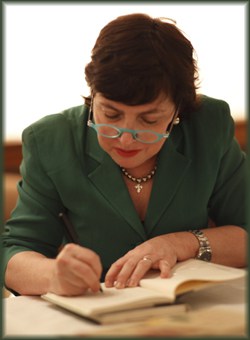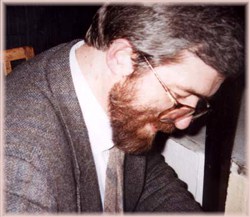

award and a three-month residency in Krakow funded by the Polish Book Institute.
The first Found in Translation Award, in 2008, was given to Bill Johnston for his translation of New Poems by Tadeusz Rozewicz (Archipelago Books, 2007). In 2009 the award went to Antonia Lloyd-Jones for her version of Pawel Huelle’s The Last Supper (Serpent’s Tail, 2008), and in 2010 Danuta Borchardt won for her rendition of Witold Gombrowicz’s novel, Pornografia (Grove/Atlantic, 2009). Candidates for the Award may be nominated by private individuals as well as by institutions in Poland and abroad. Nominations should be sent with the subject-heading FOUND IN TRANSLATION to: The Polish Book Institute, 31-011 Krakow, ul. Szczepanska 1, Poland, e-mail: biuro@instytutksiazki.pl
Szymborska is a poet of looking, and looking askance. Her voice, expressed through simple, wry declarations and observations — tactfully and succinctly translated into English for many years by the team of Clare Cavanagh and Stanislaw Baranczak [….] Often, Szymborska’s poems re-create the fleeting instant when disbelief is in suspension and an act of the imagination can take place. – Dana Goodyear, Los Angeles Times
No reader, not even poetry-phobes, should miss the bright revelations of Nobel laureate Szymborska. […] Szymborska is sharply ironic and lithely philosophical, pondering the phenomenal precision of dreams and the elusiveness of meaning. The neat, prancing lyrics collected in this slender, piercing book are delectable and profound. –Booklist
VERMEER
So long as that woman from the Rijksmuseum
in painted quiet and concentration
keeps pouring milk day after day
from the pitcher to the bowl
the World hasn’t earned
the world’s end
– Wislawa Szymborska (tr. Clare Cavanagh and Stanislaw Baranczak)
The award will be presented at the conclusion of the “After Milosz” Festival of Polish Poetry organized by Professor Michal Pawel Markowski, The Stefan and Lucy Hejna Chair in Polish Language and Literature at the University of Illinois at Chicago, to take place Sunday, October 2, 2011, at 4pm at the Chopin Theatre in Chicago’s Wicker Park neighborhood. The festival, in honor of the centenary of the birth of Czeslaw Milosz, will run from September 31-October 2, and will feature events including readings by leading poets from the U.S. and Poland including Jorie Graham, Charles Simic, Adam Zagajewski, Piotr Sommer, Marzanna Kielar, and others, a performance by Polish rap duo Fisz/Emade, scholarly panels, and more.
WHAT: Found in Translation Award Ceremony
Translator Clare Cavanagh will receive the Found in Translation award on behalf of herself and Stanislaw Baranczak from a delegation including Grzegorz Gauden, Director of the Polish Book Institute in Krakow, and Jerzy Onuch, Director of the Polish Cultural Institute in New York.
WHEN: Sun, Oct 2, 2011, 4pm
WHERE: Chopin Theatre
1543 W Division
Chicago, IL 60642
Tel. 773.278.1500
www.chopintheatre.com
DIRECTIONS: http://www.chopintheatre.com/directions.php
ADMISSION: Free and open to the public, but reservations required – Contact Agata Kopacka, akopacka@uic.edu
Clare Cavanagh is a specialist in modern Polish, Russian, and Anglo-American poetry. Her book, Lyric Poetry and Modern Politics: Russia, Poland, and the West won the 2011 National Book Critics Circle award for criticism, and her earlier work Osip Mandelstam and the Modernist Creation of Tradition has received numerous prizes. She is an acclaimed translator of contemporary Polish poets such as Adam Zagajewski and Wislawa Szymborska and is currently working on an authorized biography of Czeslaw Milosz, entitled Czeslaw Milosz and His Age: A Critical Life (Farrar, Straus, and Giroux). She is a Professor in the Department of Slavic Languages and Literatures at Northwestern University.

Wislawa Szymborska (b.1923), poet, translator, editor, was awarded the Nobel Prize in Literature in 1996, „for poetry that with ironic precision allows the historical and biological context to come to light in fragments of human reality.”

The POLISH CULTURAL INSTITUTE (www.PolishCulture-NYC.org), established in 2000, is a diplomatic mission dedicated to nurturing and promoting cultural ties between the United States and Poland, both through American exposure to Poland’s cultural achievements, and through exposure of Polish artists and scholars to American trends, institutions, and professional counterparts.
The Institute initiates, organizes, promotes, and produces a broad range of cultural events in theater, music, film, literature, and the fine arts. It has collaborated with such cultural institutions as Lincoln Center Festival (Kalkwerk in 2009); BAM (Krum by TR Warszawa in BAM’s 2007 Next Wave Festival, which received a Village Voice Obie Award); Art at St. Ann’s (TR Warszawa’s Macbeth, 2008); Martin E. Segal Theatre Center, CUNY Graduate Center; La MaMa E.T.C.; Film Society of Lincoln Center (Kieslowski and Wajda retrospective, among others); The Museum of Modern Art; Jewish Museum; PEN World Voices Festival; Poetry Society of America; Yale University; and many more. PCI co-produced the off-Broadway run of Irena’s Vow, with Tovah Feldshuh, which ran on Broadway in 2009, as well as the widely acclaimed New York Unsound Festival of contemporary music in 2010 and 2011, and the Focus! Festival of work by modern Polish composers at Juilliard in 2011.
The Polish Book Institute (Instytut Ksiazki) is a national institution established in Krakow by the Polish Ministry of Culture in 2004. The Institute’s basic aims are to popularize books and reading within Poland, as well as to promote Polish literature worldwide. These aims are accomplished by:
• promoting the best Polish books and their authors;
• educational activities designed to encourage regular book reading;
• introducing Polish literature abroad;
• organizing research visits for translators;
• increasing the number of translations from Polish into foreign languages through the © POLAND Translation Program; and
• making information on Polish books and the Polish publishing market accessible to foreign consumers.
The Polish Book Institute presents Polish books at national and international book fairs, arranges appearances by Polish writers at literary festivals, participates in programs designed to promote Polish culture worldwide, publishes catalogues of “New Books from Poland”, runs study and educational activities, and sets up meetings and seminars for translators of Polish literature.
http://www.bookinstitute.pl/
The Polish Cultural Institute in London is a part of the Polish diplomatic mission in the UK, tasked with the aim of promoting and fostering an understanding of Polish culture throughout the country. With offices based in Soho, the heart of creative London, the Institute devises programmes of cultural evens in the genres of visual arts, film, theatre, music and literature, in collaboration with the most established as well as cutting-edge British cultural organisations.
http://www.polishculture.org.uk
W.A.B. Publishers was established up in 1991 as a private company by three partners: Wojciech Kuhn, Beata Stasinska and Adam Widmanski. The money to publish the first titles came from the founders’ private savings.
The firm started with medical handbooks, but now W.A.B. Publishers is a successful company publishing Polish and foreign contemporary literature. Currently W.A.B. has the leading position in publishing and promoting Polish contemporary fiction. W.A.B. is also a leader in selling rights for the Polish authors’ books abroad. W.A.B. has signed almost 300 contracts concerning about 100 titles. W.A.B. publishes over 120 new titles per year, and approximately half of them are foreign.
http://www.wab.com.pl/?en-content=about-us
